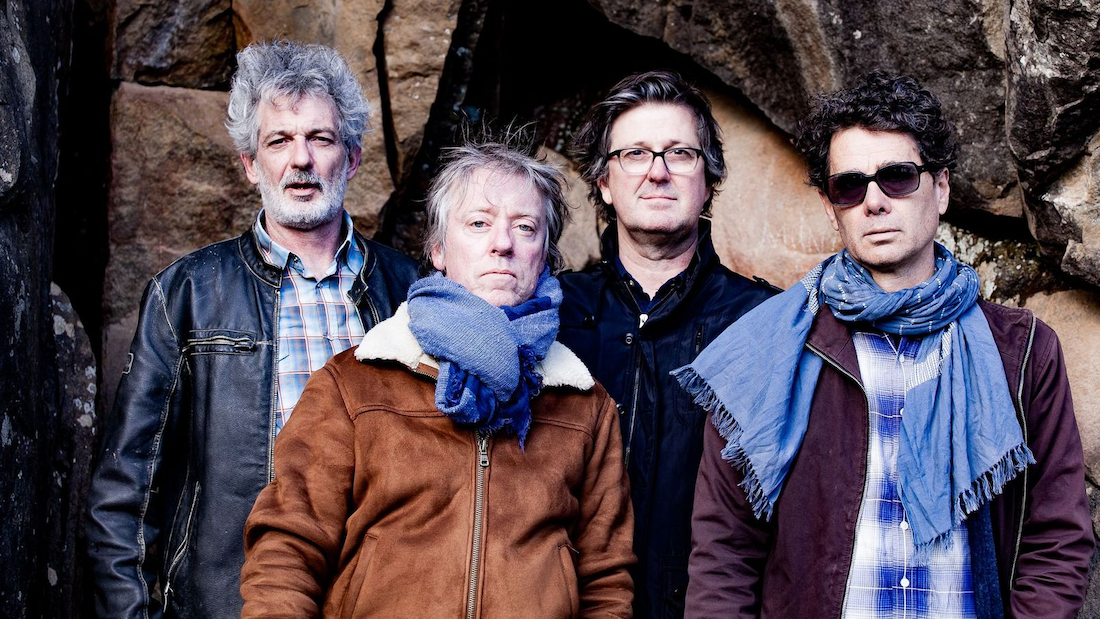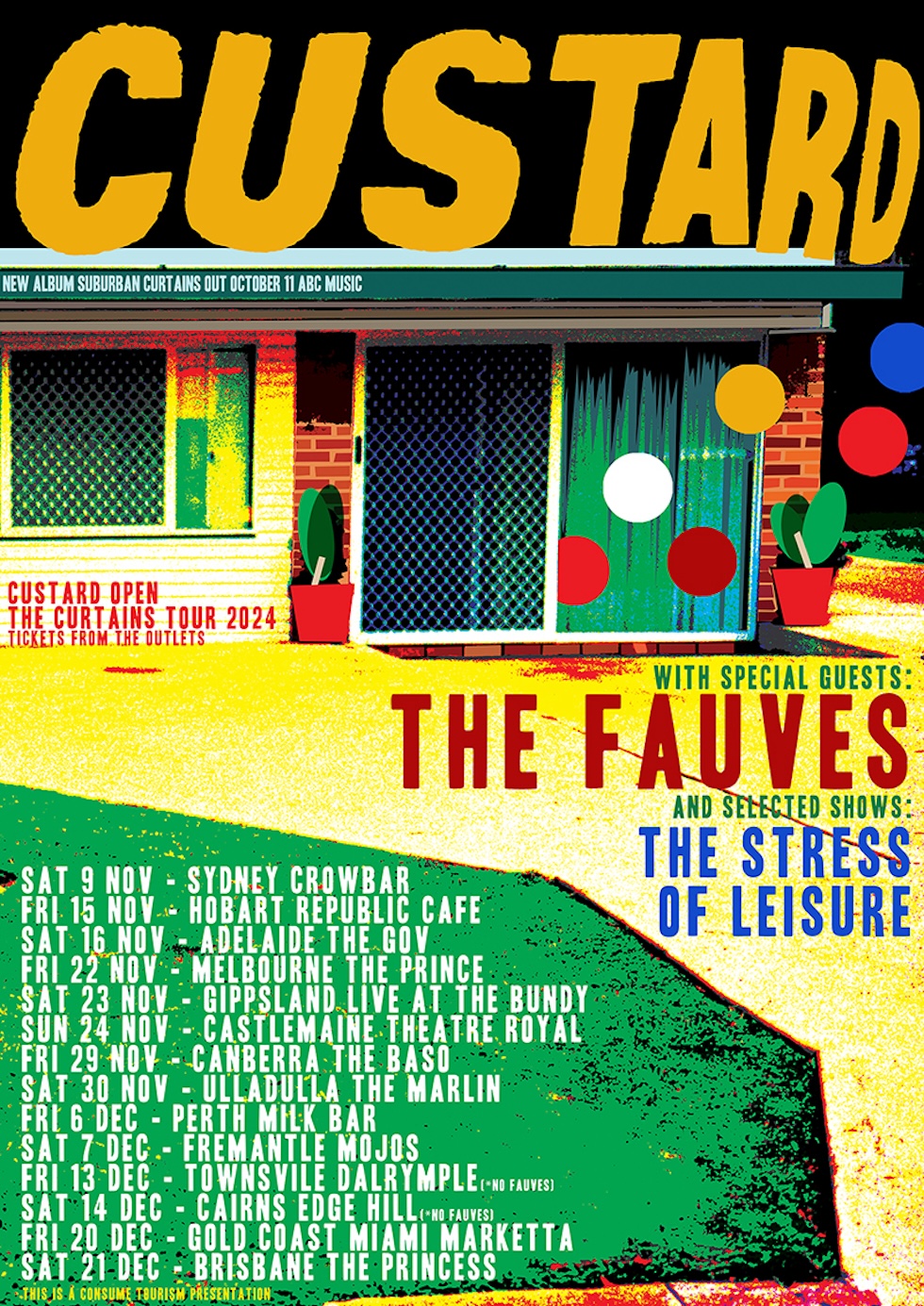
Custard raise the curtain on new double album and national tour
Brisbane indie rockers Custard are heading out on a national tour in celebration of their ’90s revivalist double album’, Suburban Curtains. They will be joined by special guests The Fauves and The Stress of Leisure for the full 14-date tour, including the two Perth shows at Milk Bar in Inglewood on Friday, December 6, and Mojos Bar in Fremantle on Saturday, December 7—with tickets on sale now. KAREN LOWE spoke to drummer and producer Glenn Thompson to find out about recording at MONA, op shop records, and what’s changed (and what hasn’t) in 35 years of Custard.
You guys are just about to release a new album, Suburban Curtains. Not that we’re complaining, but in a world where most bands are making shorter albums, why did you guys decide to make a double album?
Oh, look, it just happened. We just had that many songs, and we managed to record them all because we record quickly as we like spontaneity. We were not expecting them all to work, but they did, and that was the result.
I hear you guys recorded Suburban Curtains at MONA (Museum of Old and New Art) in Tasmania. What was that experience like?
Yes, that was exciting and fun. When we learned that they had the Abbey Road mixing desk there and some old eight-channel tape machines, we thought, “Wow, that’ll be fun. That’ll sound good.” Also that limitation; we went with that as well, and we thought we would just record eight tracks to begin with. The basic tracks were just two guitars, bass, and three microphones on the drums, a guide vocal, and a room mic. Pretty basic stuff.
And are you happy with how it all turned out?
We’re all actually really happy. Very happy. We always are and always think, “Wow! This is the best thing we have done.” I got the test pressing of the vinyl last week. Sounds great. I’m really very stoked because I do all the mixing as well.
And what’s your favourite song from the new album?
It’s funny going into it my favourite song because when we demoed the tracks, first of all… everyone came to my place beforehand and we just played each other our songs on acoustics cards and learned them all. There was one of David’s songs that I really liked, but I can’t think of which song off the top of my head. Yeah, no, they’re all good. I don’t have a favourite.
The new single Someday, featuring Serena Ryder, was apparently an old song. Is that correct?
Yeah, I didn’t know that actually until David started doing the press for that—that he’d written it so long ago. I’d never even heard of Serena Ryder before either. Before he sent it to me, he said, “Here’s my vocal track, and here’s Serena’s,” and I wondered who that was. I looked her up and got to know her song. She’s great.
You guys are also about to head out on tour with The Fauves, who have been around for just as long as Custard…
Yes, we used to play a lot together.
Are you looking forward to the tour? And is there anywhere that you guys are going this time that you haven’t been before?
We’re playing in a place called Ulladulla in New South Wales, which is kind of local to where I live now. I moved out of Sydney down to the south coast a couple years ago. It’s my local now. So that will be interesting. I’m definitely looking forward to it because The Fauves have a new album out as well. We’re also touring with the Stress of Leisure, who are fantastic. We’ve played with them before, and they’ve got a new album too. It seems like a lot of Aussie bands have got new albums out as well.
Yeah, you are right, actually! It has been very good though, so I’m not complaining. Funnily enough, actually, this will be the first time I’ve seen The Fauves, and they have been around for that long.
They have. That means you are coming to the show. Beauty!
Custard have been around for 35 years, with you being in the band since 1997. What are some of the biggest changes that you have seen in the industry? And what challenges, or improvements, have those changes brought?
I suppose the biggest change is that the way we record these days is very different from the way we used to back then. We used to go into a studio, spend a lot of money, have all the professional people do all their things, and end up with a record. Now, however, at least since the early 2000s, when digital recording became something you could do on your home computer, we all learned how to do that. That means that the way we record now is that we do the basic tracks at a studio and then take them all home to our own home studios.
And so, you know, David will work on his songs, and he’ll record all the overdubs, any extra instrumental parts, and vocals at his place, and Paul would do the same, and I would do the same, etc. Then I get everyone’s files and then mix it all. That is a huge difference from how things used to be.
But apart from that, it’s pretty similar. It’s just the fact that we don’t have big label/big record company money anymore. We all just pay for everything with what we can make touring.
I suppose then again, you’d also save the money through the recording as well.
Oh yeah—it’s so much cheaper. I mean, we still owe money to the big record label we used to be on. We never paid off those recordings in America. It was good fun, though!
Custard is still known as a ‘90s band’ even though you have just as many releases in the last 10 years as in the 90s. Have you found that to work in your favour with the whole 90s revival? Or is it a bit of a hindrance?
It’s not a hindrance. It’s just a funny quirk. People always talk about us in the past tense because people know us from that time. It’s odd because people can say, “Yeah, I saw you recently played such and such venue,” and then they’ll start talking about you in the past tense. You just saw us. It’s weird, but I understand. You think about things in the way that they came to you; I think musically. Especially with music.
It’s something that defines a time and place for people, so that’s very understandable. The 90s revival thing… I haven’t really seen any evidence, but what I always say is that I feel really lucky that we’re still allowed to do it. So I suppose that that counts into that. I mean the fact that people still come and see us. I think we’re really lucky.
Wasn’t the 90s just yesterday anyway?
(laughs) Exactly.
What was your sliding doors moment? Something where everything clicked into place and put you in the position that you found yourself in today?
That’s an interesting question. I think it was probably, well, there might have been a couple, but I think, you know, I met David a very long time ago—way before I joined Custard. I was in another band with him, and I think that meeting him through a mutual friend led to lots of other musical things in my life occurring.
As a fan, it’s often quite hard to go up to your idols and say hello, for fear of being turned away or fear of seizing up and sounding like an idiot. As a musician, how do you go up meeting your idols? And have you ever gone to speak to someone and just seized up?
Yeah, yeah, I have. You know who it was? It was Molly Meldrum. I just got so nervous. I grew up with him on Countdown, and that made me the most nervous. Normally I just hide. I just think it’s not worth it. It’s too scary (laughs).
Finally, what’s an album in your music collection that no one would expect you to ever own?
I’ve been buying a lot of records from a local op shop this year, so I’ve got a lot of really quite old records from the 40s, 50s and 60s. There are records that I’ve never even heard of before—some instrumental things, and I can’t even remember the names of them. I go through and I look at them, and I buy anything that has got no scratches, basically, and I just take them home and listen to them.
I’ve got a lot of very weird old records that way. Some of them are instrumental records; some of them are like music for waltzing to, and some are—you know—young people’s party kind of thing back when that meant something very tame.
So yeah, that would be the unexpected thing, but nothing I can actually name.
I suppose any of that kind of thing as well would just help expand your mind and help down the track as well?
Yeah, I get a lot of inspiration for the mixing side of recording from those things because I listen to the way things were made back in a simpler time.
That was another reason why I really wanted to record on this old recording equipment at MONA too, because I thought these things just sounded fantastic. There’s a big, fat sound to these old records that’s quite simple and very, very fulfilling. So that was a big influence.

